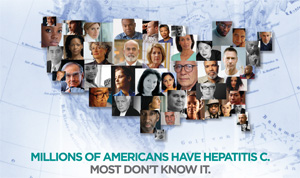The CDC Urges Baby Boomers to Be Tested for Hepatitis C

May is Hepatitis Awareness Month. Hepatitis is an inflammation of the liver that is most often caused by a virus. One type, hepatitis C, has been called a silent epidemic, because most people who have the virus that causes it are unaware that they are infected. And while some people think of hepatitis as being confined mostly to young drug addicts, in fact, hepatitis C is most common among people born from 1945 – 1965. Indeed, over 75 percent of hepatitis C cases are baby boomers.
Why are baby boomers at higher risk for hepatitis C? According to the Centers for Disease Control and Prevention (CDC), the reasons are not entirely clear—but most people with the disease were infected in the 1970s and 1980s when the rates of hepatitis C were highest. Some may have contracted it from blood transfusions before widespread screening went into place. Others may have become infected when they injected drugs during their younger years, even only once. Back then, the sterilization process at tattoo and piercing parlors tended to be less stringent, as well!
A person who is infected can live for many years without noticeable symptoms of hepatitis C, even as the disease is causing life-threatening liver damage, cirrhosis or liver cancer. Symptoms don’t usually become noticeable until a person is very sick. More people need a liver transplant due to hepatitis C than from any other cause. But early detection allows doctors to most effectively manage the disease, and research is continuing to find better treatments.
Medicare will cover one hepatitis C screening test if it is performed by an eligible doctor or practitioner. (More information is here.) Check ahead of time to see if you are covered. Your private insurance also may cover the test.
Visit the CDC’s Know More Hepatitis web page to learn more about the diagnosis and treatment of hepatitis C.
The information in this article is not intended to replace the advice of your doctor. Talk to your healthcare provider about the hepatitis C test and other recommended screenings.
Source: IlluminAge with materials from the Centers for Disease Control and Prevention (CDC). Image: U.S. Centers for Disease Control and Prevention.


